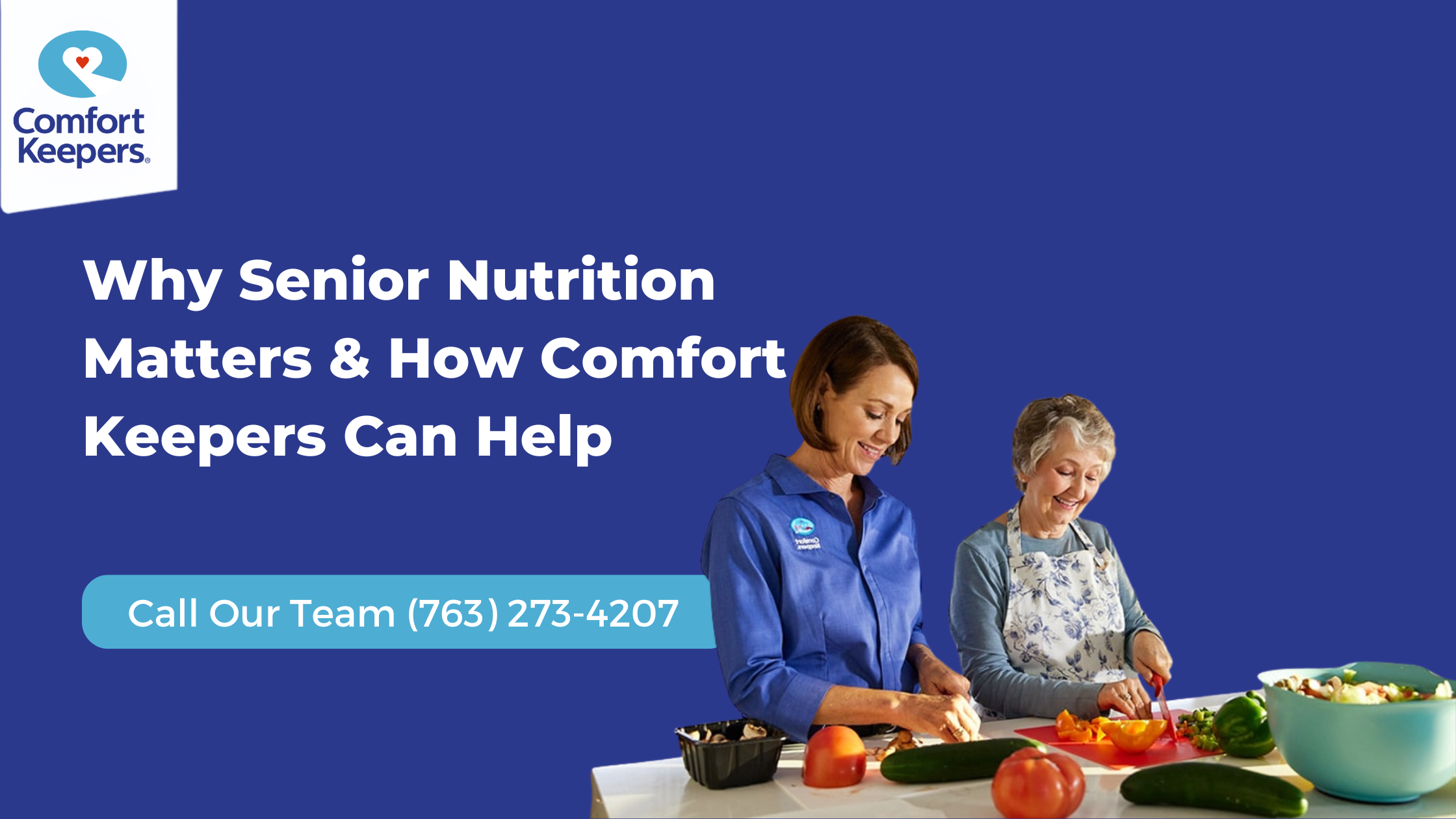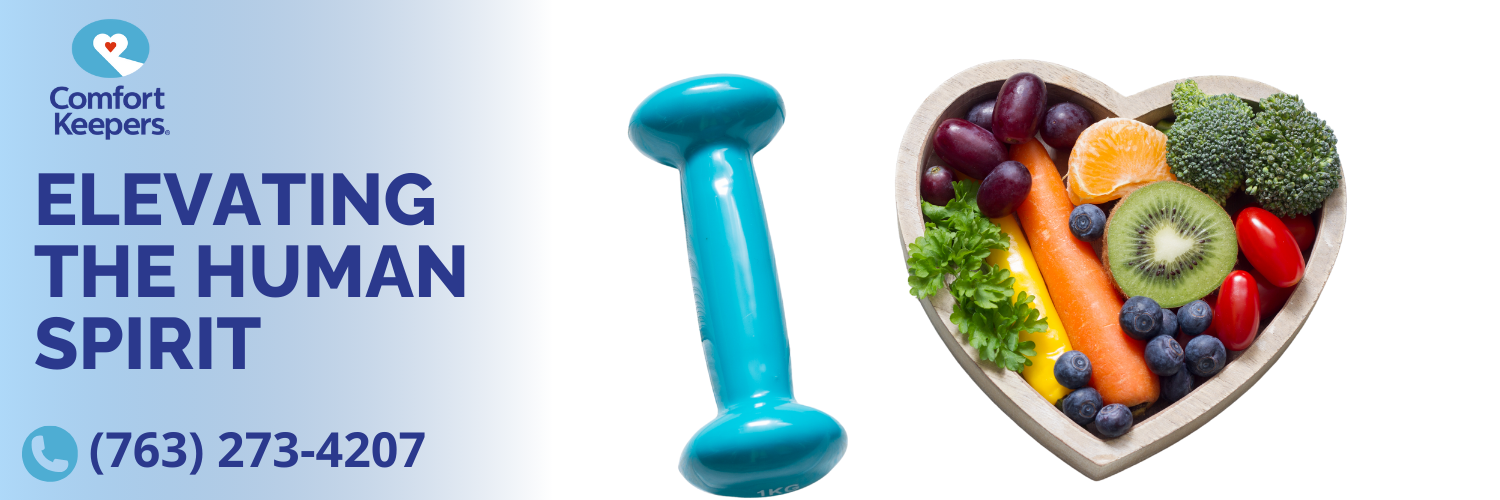
Why Senior Nutrition Matters & How Comfort Keepers Can Help
Nutrition is essential for a healthy lifestyle at any age, but it becomes even more critical for seniors, who often face unique challenges with meal planning, food preparation, and eating. In fact, studies show that nearly 1 in 3 older adults do not consume enough essential nutrients, increasing their risk of chronic health conditions. Healthy eating for seniors must take into account dietary restrictions, mobility limitations, and medical conditions while ensuring meals meet proper senior nutrition standards to support overall well-being.
Why is Nutrition for Elderly Adults Important?
Food is an absolute necessity; it fuels the body and helps it stay strong. However, as we age, our bodies struggle to absorb the nutrients that we need to keep happy and healthy in our golden years. That’s why nutrition for elderly adults is so important.
When seniors eat a healthy, balanced diet, they can benefit from:
Greater energy
Improved physical fitness
A stronger immune system
Better mood
Lower risk of heart disease
Quicker recovery from illness and injuries
Increased connection with loved ones
Better overall wellbeing
However, at the same time that seniors need to be paying close attention to their diet, many of them experience challenges. Some aging adults notice:
Strengthen and coordination issues that can make cooking and handling utensils difficult.
Decreased appetite and thirst.
Difficulty with chewing and swallowing.
Food allergies and other medical dietary restrictions.
Weakened taste buds that make food less appealing.
Memory issues that can result in skipped meals.
Because of these difficulties, seniors can easily become malnourished and dehydrated, increasing the risk of illness and injury and reducing their quality of life. So, it is absolutely crucial that seniors and their caregivers develop a healthy, well-balanced diet that works for them.
What Does Healthy Eating for Seniors Look Like?
Because aging bodies are not very efficient at absorbing nutrients, senior nutrition professionals recommend prioritizing vitamin-rich foods.
A well-balanced diet plan for seniors should include:
Water. Seniors often experience decreased thirst, risking dehydration. In addition to encouraging seniors to drink water and other hydrating, low-sugar beverages, you can also sneak in extra hydration through water-rich foods like melons, fruits, cucumbers, lettuce, tomatoes, zucchini, cabbage, yogurt, cottage cheese, and soups.
Protein. Protein repairs muscles and bones and maintains healthy blood pressure levels, so it can help protect seniors from muscular, bone, and heart health issues. Look for protein-rich foods like chicken, turkey, fish, eggs, Greek yogurt, and legumes.
Carbohydrates. Regardless of what fad diets say, carbohydrates are the body’s main fuel source, and they are an important part of a senior’s diet. Healthy carbohydrates include oats, brown rice, chickpeas, bananas, sweet potatoes, whole grains, beets, oranges, apples, and beans.
Healthy fats. Like carbohydrates, diet culture has made “fat” into a scary word, but healthy fats—like olive oil, avocados, nuts, and tofu—are important for maintaining a senior’s heart and gut health.
B vitamins. B vitamins like B6, B12, and folic acid improve brain function, making them key to combatting the cognitive symptoms that often come with aging, and they also assist with metabolism. For B6, try whole grains and organ meats. B12 can be found in lean meats and fish, and dark greens, beans, and peas are a great source of folic acid.
Calcium. Calcium plays an important role in building strong bones, reducing the risk of fractures and allowing seniors greater mobility and dexterity. Foods like cheese, milk, yogurt, broccoli, and kale are excellent sources of calcium.
Vitamin D. Many seniors spend less time outside than younger adults, so they don’t get much vitamin D from sunlight. Seniors can add vitamin D into their diet with eggs, salmon, trout, tilapia, and raw mushrooms, as well as special vitamin D-enriched foods like whole milk, yogurts, and cereals.
Iron. Iron is necessary to support the brain and immune system, and iron deficiency is very common among seniors. Incorporate iron-rich foods like eggs, chicken, beef, shrimp, spinach, broccoli, string beans, sweet potatoes, beans, raisins, figs, and cereal.
Fiber. Fiber protects the heart and ensures regular digestion. The best sources of fiber are beans, whole grains, and vegetables.
Potassium. Potassium controls blood pressure as well as improving muscular and digestive function. Potassium-rich foods include bananas, potatoes, and yogurt.
While you probably can’t pack each of these critical nutrients into every meal, you can build balanced meal plans that address them all. Consult with your loved one’s doctor to ensure that your senior nutrition plan meets their unique needs.
Senior Nutrition Tips
Building balanced meals is only half of the senior nutrition battle; you also have to get your loved one to actually eat their meals.
Here are some tips to help you overcome the challenges to healthy eating for seniors:
Prioritize hydration. Provide seniors with water to drink throughout the day and encourage them to eat hydrating snacks like strawberries, sliced apples, grapes, and blueberries. You can also incorporate hydration into meal times by serving soups and salads.
Find variety. Healthy eating doesn’t have to be boring; build a plate bursting with variety and color. A healthy diet can include so many different foods, so plan fun and exciting meals. You can also try seasonal eating, which naturally creates variety on top of reducing costs and maximizing freshness.
Make meals easier for seniors to eat. If your senior struggles with chewing, swallowing, or mouth soreness, pre-cut food into smaller pieces and prioritize softer textures like yogurt, cottage cheese, mashed sweet potatoes, and soups. If your senior still finds eating difficult, consider puréeing items and using liquid supplements.
Incorporate finger foods. For seniors experiencing coordination issues, utensils may be difficult. Swap in finger foods like cut-up sandwiches, sliced fruits, berries, cheese cubes, crackers, veggie trays, and hard-boiled eggs.
Add some extra flavor. As taste buds dull, seniors may struggle to find a dish appetizing. Incorporate different textures and strong flavors, like herbs, garlic, lemon juice, vinegar, and spices, to give meals extra punch.
Encourage small meals. Seniors often experience digestive issues that can make eating large meals difficult. Instead of a standard three meals, some seniors benefit from staggering small meals and snacks throughout the day.
Combat mealtime stress. Some seniors get overwhelmed by meal times. Keep the dining table relatively clear and consider offering only one food at a time. Then, sit and eat with your loved one, turning meals into a chance for connection instead of a stressor.
Hire professional help. Many adults struggle to make healthy meals for themselves at the end of a long day, let alone guaranteeing adequate nutrition for elderly family members in their care. If you are finding it difficult to give your senior the balanced meals they need, reach out to a caregiving professional like Comfort Keepers.

Comfort Keepers of Osseo: Caregivers that Focus on Nutrition
At Comfort Keepers of Osseo, we take a holistic approach to senior health, supporting physical, mental, and emotional well-being. Our compassionate caregivers provide personalized care that promotes independence, dignity, and a high quality of life. As part of our Interactive Caregiving™ approach, we engage seniors in meaningful moments to work together on a common objective, including meal preparation, turning cooking into an enjoyable and stimulating experience. By preparing meals together, we encourage social interaction, cognitive engagement, and a sense of accomplishment—all while ensuring seniors enjoy nutritious meals that support their overall health. With years of experience, we proudly serve seniors in Osseo, Maple Grove, Hopkins, Minnetonka, and the surrounding area, helping them maintain a healthier lifestyle in the comfort of home.
Contact us today to learn more about how Comfort Keepers’ professional team can help your loved ones build a healthy lifestyle.









